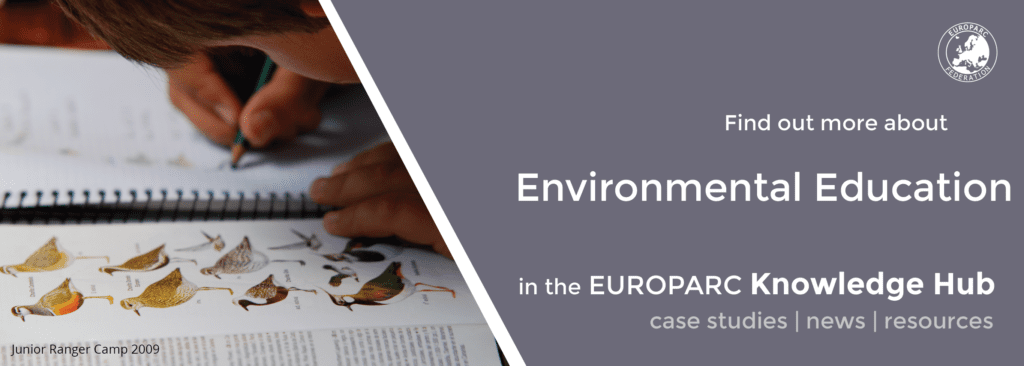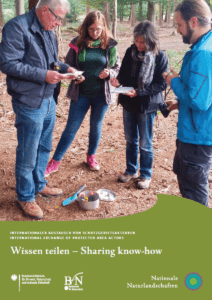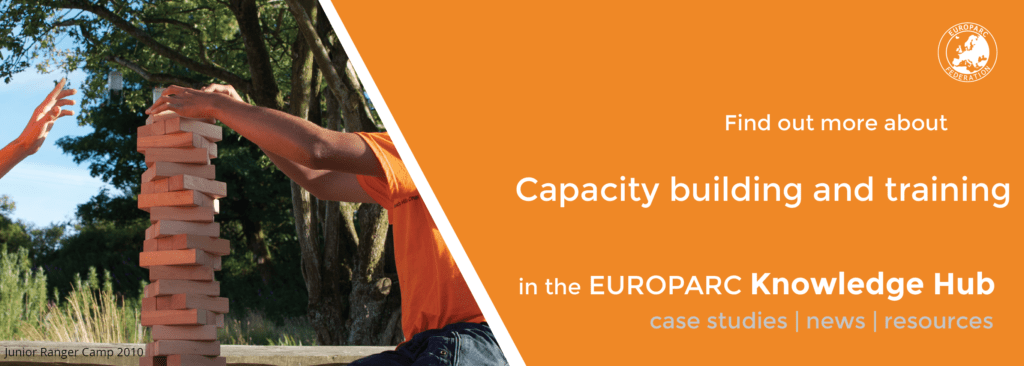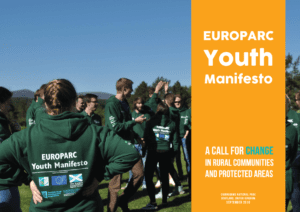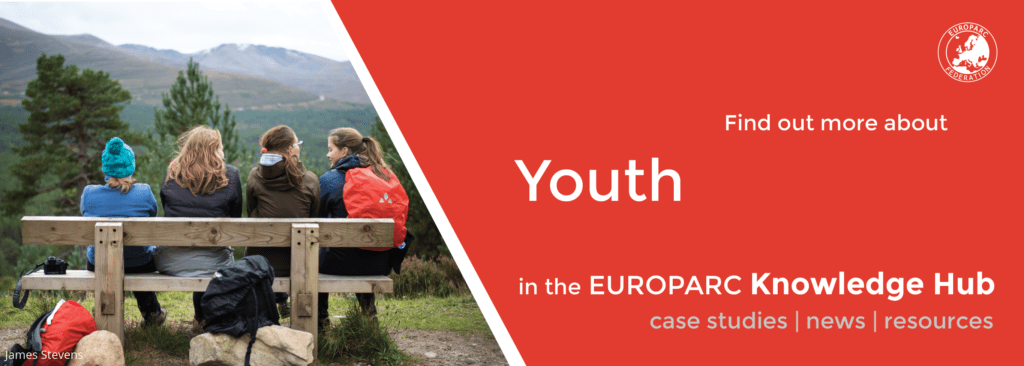The roots of the future: linking environmental education & health for kids in Italy
Experiencing springwater taste, by Maurilio Cipparone
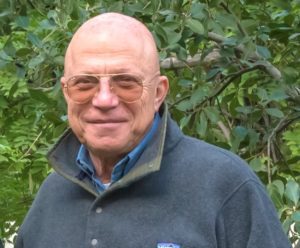
Article issued by Maurilio Cipparone. IUCN CEC & WCPA member, involved in nature conservation and parks for 50 years, in three continents. Now leading “NèB”, an Italian pilot project for children’s well-being in nature.”
A “special” nature park dedicated to the education and the well-being of “kid-rangers”
Could we transform an old farm in an extraordinary protected area? Could we go back through the years to recreate a wild marshy landscape once reclaimed for harvesting? Could the reborn wilderness be the “trigger” of an educational vision to put in practice the “Healthy Parks Healthy People (HPHP)” global strategy? Moreover, could children be the main actors in this process?
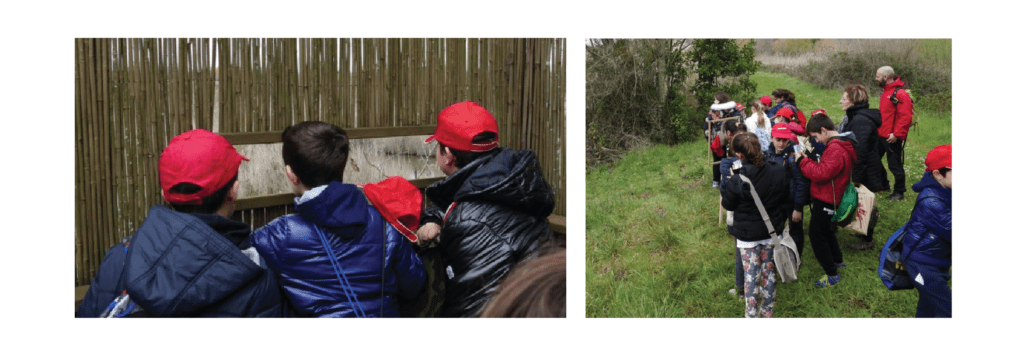
The answer is YES: the protected area has been established and named “Pantanello Nature Park”; the abandoned farm’s landscape has been “reclaimed back”; the HPHP vision has been implemented and more than 2,000 school children have been the main actors of an educational programme started in 2015 and still going on, gaining national relevance as a “pilot project”.
But let’s go back to the Park and to the “Kid-rangers” project.
In Italian, ‘pantanello’ means ‘little swamp’. Until 1993, Pantanello was actually an old farm, bordering the renowned Garden of Ninfa Natural Monument. Both the Garden and Pantanello are owned by the Roffredo Caetani Foundation, which manages the cultural and natural heritage of one of the oldest Italian dynasties. Since Roman times, the land has been an extensive marshland, until it was reclaimed in the early thirties to be harvested by veterans.
The farm was gradually abandoned, the ancient landscape – with its natural and cultural values – began to recover: the Foundation, according to its objectives, committed to creating a Park to conserve nature and culture values. They dug a network of ponds to host migratory bird species, built trails and birdwatching shelters, and restored barns and buildings which are now used as classrooms and environmental education labs.
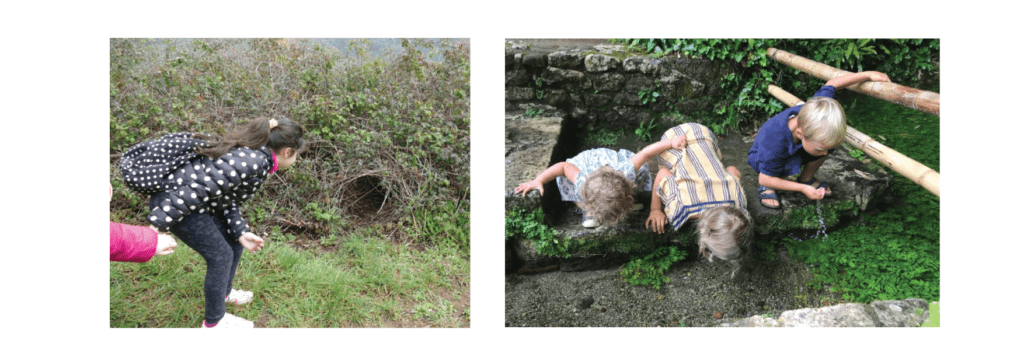
Promoting health and well-being for children
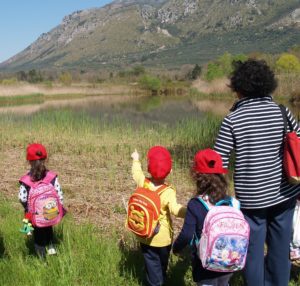
Exploring the ponds
In 2013, Pantanello hosted the second Italian BioBlitz and in 2014 the “Roots of the Future” project started, with the ambition to create the first Italian protected area dedicated to, and possibly managed with, the children from local communities. The educational activities, carried out by a team from the University Consortium CURSA, have been designed for knowledge building and biodiversity conservation, but, gradually, they have been oriented towards activities promoting children’s well-being and their psychophysical development. This unusual path was motivated by the results of research demonstrating how nature can influence children health.
Outdoor play fosters children’s intellectual, emotional, social and physical development
In Pantanello’s environment, all educational objectives have been planned to promote more active lifestyles, to fight obesity, to act against video-addiction, to manage attention-deficit hyperactivity disorder (ADHD) effects.
This unusual Kid-rangers project shares the objectives of the HPHP strategy and, at the same time, it has helped to promote the commitment of the Italian Ministry of Health.
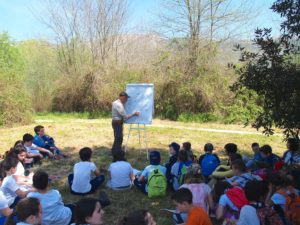
Outdoor classroom
A pilot project “NèB-Natura È Benessere” (Nature IS Well-being) has been launched with the “institutional” objectives to promote knowledge of the health benefits of green spaces for children. Through information and communication campaigns, it aims to raise public awareness and to promote, at different levels of government, the importance of the relationship between nature, biodiversity, human health, and children’s cognitive development through education and training.
Our objective, no less ambitious, is to promote awareness and actions on these issues through all Italian Parks: to keep the project’s benefits alive, building beyond the borders of the Ministry’s support.
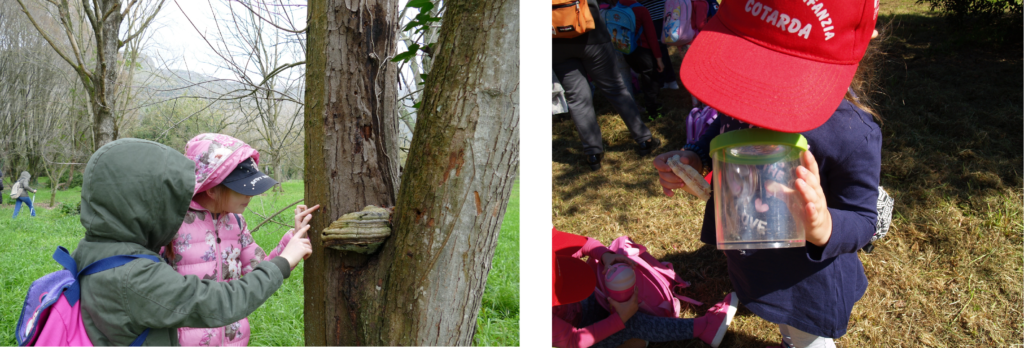
To read more:
http://www.frcaetani.it/parco-pantanello/
https://www.facebook.com/piccoleguidepantanello/
https://www.facebook.com/NaturaBenessereBambini/
You found this topic interesting? To find more articles like this one, download the new edition of the EUROPARC Journal Protected Areas In-Sight with a special focus on youth involvement Parks – available in english, german and french!
“Sharing know-how”, a manual on international cooperation by EUROPARC Germany
EUROPARC Germany launched a new manual about international cooperation: “Sharing Know-how” – the Manual is not only the output of a 3-years project funded by the German Government – it is an insight on several good practices that are being implemented by European Protected Areas.
The importance of “Sharing Know-how”
Since 1973, EUROPARC believes that European nature is better protected through international cooperation. In fact, nature knows no borders! (which is especially relevant if we think about the geopolitical changes in Europe over the last century). This mindset of international cooperation is a common belief among all EUROPARC Sections, which despite working on topics more relevant to a specific region or country, often create opportunities for their members to exchange experience and learn from abroad.
That is exactly what EUROPARC Germany has done with the project ANNIKA (Actors from National Natural Landscapes in the International Exchange of Competence), that ran from 2015 to 2018 and allowed professionals of Germany’s natural landscapes to learn & exchange best practice through study tours in several European countries.
Looking at the broader picture softens the boundaries in thinking, finds solutions, and clarifies alternatives, possibilities, new approaches and self-perception,
said a participant in the final workshop of the ANNIKA project.
The brochure covers useful and practical cases of Protected Areas from Austria, United Kingdom, Germany, Finland, and the Netherlands on topics such as:
- Regional development and tourism
- Accessibility and inclusion
- Financing Strategies
- Education for sustainable development
- Volunteer management
The publication “Sharing Know-how” is a compilation of practical examples outlined by several authors who took part in visits to protected areas in 2016 and 2017. The manual is available in English and German and serves to continue the focus on international exchange of expertise, experiences and working methods between protected areas professionals.
It is also intended to promote the outcomes of the project. According to EUROPARC Germany, “broadening the horizons through study abroad boosts an intensive method to increase knowledge and competence, provides a helpful distance to self-evidentness and habits, increases motivation through the experience of an international “circle of colleagues”, and allows the establishment of contacts for future cooperation.”
Download the full Manual:
You can also download the brochure only in English or German separately or even ask for a printed version to EUROPARC Deutschland:
English Version – Sharing Know-How
German Version – Wissen Teilen
The ANNIKA project was supported by the Federal Agency for Nature Conservation (BfN) with funds from the Federal Ministry for the Environment, Nature Conservation and Nuclear Safety (BMU).
Italian Julian Alps: the new UNESCO Man and Biosphere Reserve
Prealpi Giulie Nature Park, Italy © Barbara Pais
The Italian Julian Alps MaB was announced recently in Paris as one of the newest UNESCO’s Man and Biosphere Reserve (MaB) established in Italy. Congratulations! Here is all you have to know about this new Man and Biosphere Reserve… who is also a special member of the EUROPARC Network!
The Italian Julian Alps MaB
The new MaB Unesco Biosphere Reserve “Italian Julian Alps” encompasses a territory of 11 Italian municipalities of the north-eastern part of the Friuli Region. The official designation includes the term Julian Alps in order to reinforce the will to cooperate with the neighboring Slovenian Biosphere Reserve Julijske Alpe.
We wish to have in the future a unique Transboundary Biosphere Reserve of the Julian Alps,
said Stefano Santi, Director of the Prealpi Giulie Nature Park.
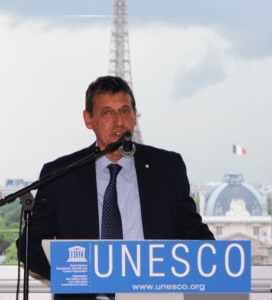
Stefano Santi, Director of Prealpi Giulie Nature Park, in Paris June 2019, receiving the Certificate of the new establish UNESCO MaB Reserve Italian Julian Alps
UNESCO appreciated not only the extraordinary biodiversity and amazing landscapes of the area but also the strict relation with Slovenia witnessed by the Transboundary Ecoregion Julian Alps certified by EUROPARC Federation both as Transboundary Park and with the European Charter for Sustainable Tourism.
The new Biosphere Reserve will give to all the area an extraordinary possibility to become a pilot area in the testing of new forms of sustainable development with a transboundary shared vision.
The President of the Prealpi Giulie Nature Park Andrea Beltrame thanked all the people and institutions that supported the candidature, especially the Young Advisory Board of the Park, fundamental for recognition of the strong involvement with the local community that the Park pursues.
A Transboundary Park, a Sustainable Destination and a UNESCO MaB region… all in one?
The Prealpi Giulie Nature Park, the entity that managed the UNESCO MaB application process and will be in charge of the coordination activities of the MaB Reserve, is a very special member of the EUROPARC network: since 2007 they are following the EUROPARC’s Transboundary Parks Programme, working side-by-side with its Slovenian neighbour – Triglav National Park. Together, they form the Transboundary Ecoregion of the Julian Alps, sharing natural and human resources, projects, monitoring data, and visitors!
In 2016, the park authorities across borders gave another unifying step and became the first Transboundary Park working together to become a Sustainable Destination. By following the methodology of the European Charter for Sustainable Tourism in Protected Areas, the Parks have now a common vision for tourism development in the region and work every day to make this vision real.
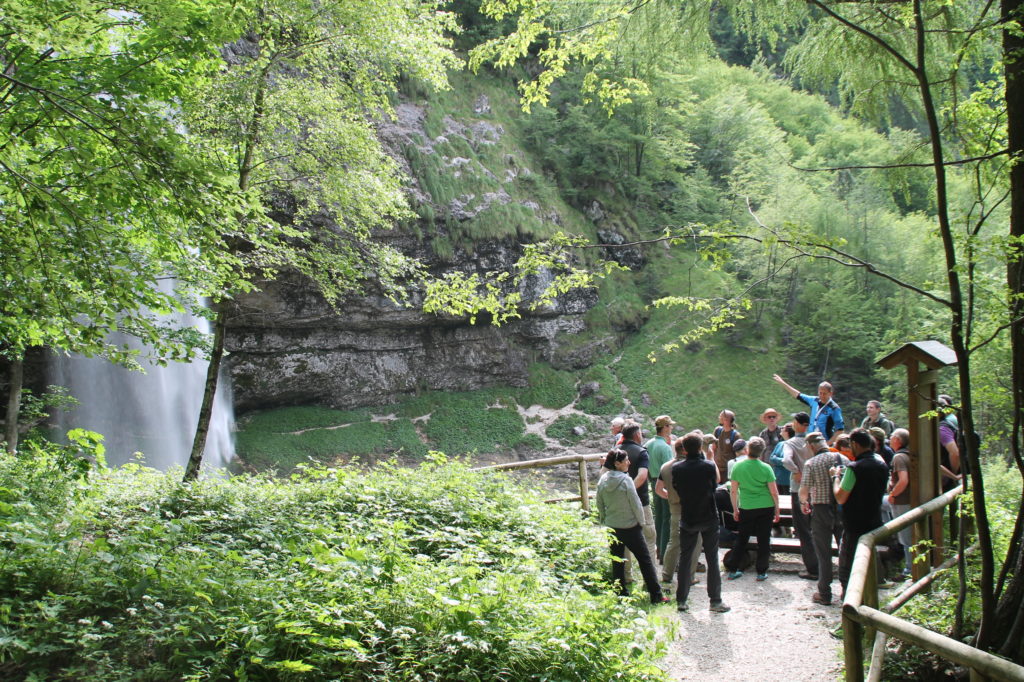
Field trip in Prealpi Giulie Nature Park (IT) 2017 – TransParcNet Meeting in the Julian Alps Transboundary Ecoregion
The beginning of something new: the EUROPARC Youth Manifesto
EUROPARC Youth Manifesto
A Call for Change in Rural Communities and Protected Areas
By Steffi Burger
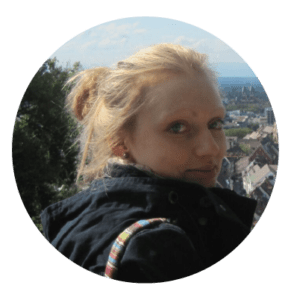
During 2018, the EUROPARC network could feel something was moving: a Youth Manifesto was in the making. Young people were making themselves more and more visible within the network: ready to have their voices heard by the Federation and Protected Areas across Europe and ready to question the status quo. After its official launch at the EUROPARC Conference 2018 in the Cairngorms National Park, there was no way to avoid noticing the EUROPARC Youth Manifesto.
Put forward by a group of committed youngsters aged 15 to 25 growing up in parks and rural areas all over Europe, the EUROPARC Youth Manifesto sparks ideas for the involvement of young people in nature and calls on decision-makers to empower the younger generation in shaping the governance of our common parks and rural places.

Youth exploring the surroundings in Kalajoki.
Why a EUROPARC Youth Manifesto?
“We are the next generation of people who will live and work in rural and Protected Areas. However, we are leaving. Leaving to find easier lives in the big cities – and with us leaving, our nature will begin to wither.” (EUROPARC Youth Manifesto Project, EUROPARC Conference 2018, Cairngorms National Park)
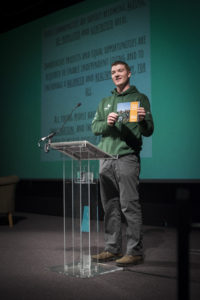
Youth Manifesto presentation
Across Europe, rural communities face similar challenges: they struggle with an image of clinging onto traditions, neglecting societal changes and not picking up opportunities arising through technology. Young people and families are the future of rural places in Europe, and yet they are increasingly moving to bigger cities, that promise good education, viable jobs, more diverse career opportunities, reliable infrastructure, tolerant mindsets and greater freedom for self-development.
“This must change: We must engage young people with nature and support them to experience what fantastic places rural and Protected Areas are to live in.”
Many youngsters want to stay, but it proves a challenge to provide enough infrastructure for social activities, affordable housing and attractive, long-term job prospects for young professionals to make a living in rural areas. Protected Areas, likewise, often find it hard to attract youngsters and encourage them to engage more with the natural environment.
“To achieve change, we must first resolve the issues young people face by staying in these areas.”
If they open up to embrace change and listen to young people, rural places hold great potential to support the younger generation: to experience the beneficial effects the outdoors can hold for their health and personal development; to allow them the chance to develop a deeper sense of connection and responsibility to look after our nature.
How can we understand the challenges young people face living in these places – and how can we tackle them? Let’s ask the youth and listen:
Between May and September, a diverse group of youngsters aged 15-25 from across Europe came together in two face-to-face workshops and collaborated online to exchange their personal experience and map out the challenges young people face when living, learning and working rurally.
They discussed common challenges and inspired each other with successful examples from their regions, where cooperation across generations and youth-led initiatives are already successfully co-creating sustainable solutions. The workshops were all about experience sharing, creating ideas and drafting the Manifesto. Working groups came up with some very concrete ideas about how to support young people in building a good life in rural and Protected Areas: ideas that allow their voices to be heard more intently by decision-makers at a local level.
The youth proposals include:
- running youth empowerment workshops;
- training provision for decision-makers on how to better empathize and communicate with young people;
- and, installing Youth Councils or having a young person representing youth interests in councils and boards.
Read all the Youth proposals from the EUROPARC Youth Manifesto –available for download in several languages at https://www.europarc.org/youth-manifesto/
Inspired by the next Generation at EUROPARC Conference 2018
After months of online and offline co-creation, the young participants finally launched the EUROPARC Youth Manifesto on the final day of the EUROPARC Conference 2018. Delegates had become curious to learn from the youth – tremendous excitement for the release of the Manifesto built-up throughout the Conference. Over 60 youngsters from the project were around making their presence known!
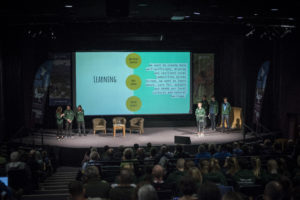
Launch of the EUROPARC Youth Manifesto at EUROPARC Conference 2018, Scotland
Dressed up in their green sweaters, young people engaged with delegates during activities, displayed the project at their bright purple info stand and made themselves heard unexpectedly, stirring up the Conference programme with several surprises. A short theatre performance and a flashmob showed in a playful way that youth are capable to contribute what it is needed to create a sustainable future: creativity, joy, and some fresh ideas.
The pledges made by the youth on stage at the official launch fell on fertile ground. Young people pitched their pledges to delegates supported with examples from their personal lives growing up in rural areas. Their clear message reached delegates who, thriving off the inspiration sparked by the youngsters with their Manifesto launch, rushed to the Manifesto stand to get their printed copies and discuss ideas with the young ambassadors on the spot.
Obviously, youngsters didn’t only want to talk about joining forces; there have been enough nice words in the past. It is now time for action and joining forces in practice! Initial project ideas were discussed and some of the youngsters had the chance to work out concrete plans for follow-up action with delegates and authorities in their parks and communities once back home.
The younger generations of today are the ones in charge to shape and manage our communities and parks tomorrow – they should be involved in the management and decision-making already today. All you need to respond with is an open mind, curiosity to learn with the youth and trust that creating together is the way forward.
“We are ready to take action with you – now we need you to respond” (EUROPARC Youth Manifesto Project 2018)
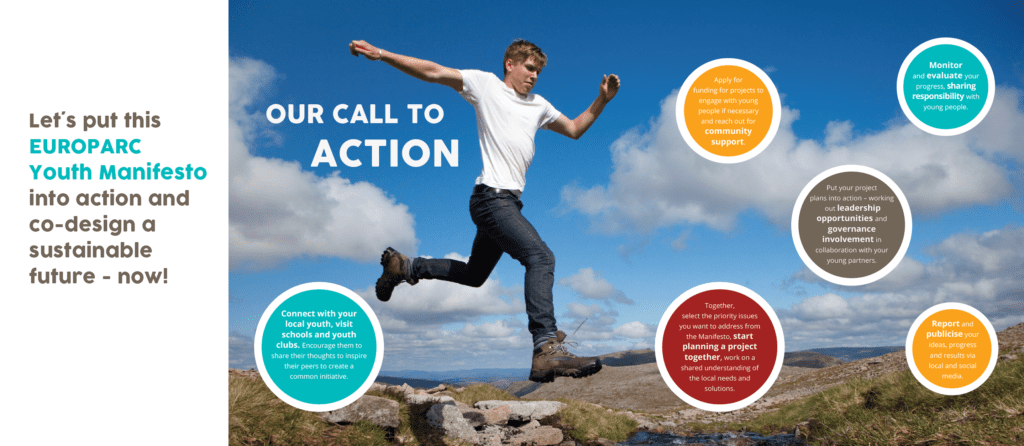
EUROPARC Youth Manifesto
What’s next?
Taking action and implementing change with the EUROPARC Youth Manifesto
The Youth Manifesto is now out there. Addressing decision-makers, but inviting initiative from all of us living, learning and working in parks and rural areas together. It provides you with ideas to kick-off concrete projects in your areas and is a powerful back-up reference document when talking to your local authorities, decision-makers, park managers and when engaging with youth in your community.
“Looking forward to making some headway internally within our National Park. We are doing a presentation to our board of members at the next Authority meeting, we are also in the process of setting up a youth forum!! Exciting times.”
Katy Foxord, youth involved in the Manifesto project
The EUROPARC Youth Manifesto was created as an output of a transnational LEADER project, led by the Cairngorms National Park Authority in collaboration with the three Finnish LEADER groups Rieska, Keskipiste, and Ravakka; the Cairngorms Local Action Group; Scottish Natural Heritage; Young Scot and the EUROPARC Federation. The project supported the Scottish Year of Young People 2018 and will continue into a second year.
Interview with Steffan Gwynn (23),
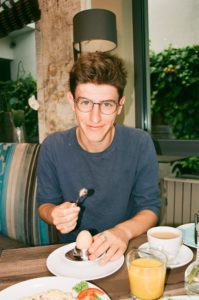
Steffan Gwynn
Snowdonia, North Wales
From your experience: What is the greatest challenge you face / your peers face living, learning, working in your area?
· Living: Lack of affordable houses and terrible public transport.
· Learning: Lack of opportunities to learn locally.
· Working: A lot of the work is seasonal – especially that which is based on tourism.
What do you think: Why should your own community/park use the Manifesto?
Snowdonia could really use the Manifesto to provide a platform for young people to get involved with all aspects of the work of the park, to create a sense of shared identity based upon place and to locate the park within a broader family of European protected areas – there’s no denying that foreign travel and the world outside is a really appealing prospect to many young people.
If you had a free wish (or the time, money and power it takes): what project would you start with your friends in your community to make it a better place for youngsters to live, learn and work in?
Better infrastructure – running commuter trains side-by-side with the steam trains that are run for tourists over the summer; electric car charging stations; electric bike subsidies; a regular bus service.
Interview with Laura Peters (23),
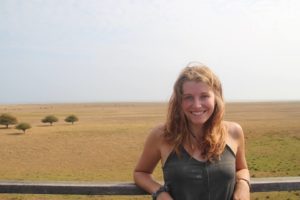
Zwolle, Netherlands,
EUROPARC Youth+ Ambassador and Representative in EUROPARC Council
From your experience: What is the greatest challenge you face / your peers face living, learning, working in your area?
The major challenge would be “living”: There aren’t many places to rent, usually only bigger houses that are for sale.
What do you think: Why should your own community/park use the Manifesto?
It is a really great way to help the youth in your area, and you can decide for yourself which parts are applicable and that need action.
If you had a free wish (or the time, money and power it takes): what project would you start with your friends in your community to make it a better place for youngsters to live, learn and work in?
Give the Junior Ranger programme a boost and make sure there is a budget for Youth+ activities!
Make sure you keep us posted about your ideas youth@europarc.org – we’re thrilled to learn about your projects inspired by the Manifesto and make them visible throughout our European network. Let’s take action for change and co-create sustainable Protected Areas and resilient communities!
You found this topic interesting? To find more articles like this one, download the new edition of the EUROPARC Journal Protected Areas In-Sight with a special focus on youth involvement Parks – available in english, german and french!
